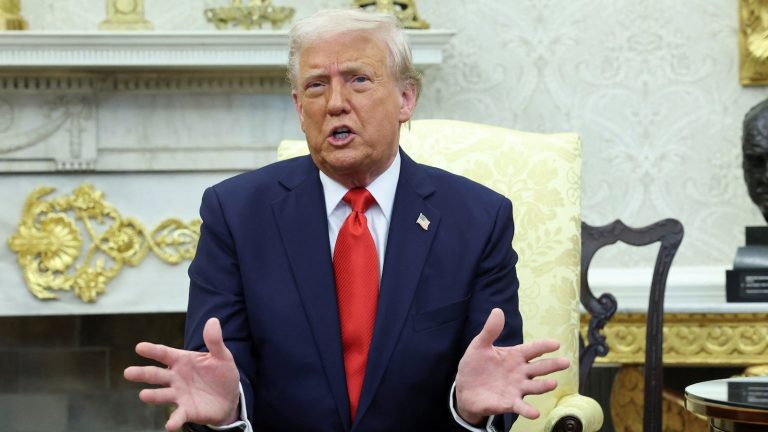In the nearly three months since President Donald Trump’s inauguration, lawyers challenging his actions in court have alleged that his administration has violated court orders on a half dozen occasions, according to court records reviewed by ABC News.
From unilaterally freezing federal funding to the use of the Alien Enemies Act to deport noncitizens, the clashes have raised concerns about the separation of powers and the potential for a constitutional crisis.
Plaintiffs suing the Trump administration have alleged the government violated or ignored court orders on at least six different occasions, but no judge so far has held a member of the Trump administration in contempt of court. On at least four occasions, judges have expressed concerns about the Trump administration’s compliance with court orders.

President Donald Trump speaks as he meets with President Nayib Bukele of El Salvador in the Oval Office of the White House, April 14, 2025 in Washington.
Kevin Lamarque/Reuters
Lawyers with the Justice Department have vigorously defended the actions of the Trump administration and argued that federal officials have strictly complied with lawful court orders, while also questioning the legality of some orders. Each of the cases are ongoing or being appealed, so the district court orders may be vacated as higher courts weigh in.
Trump has repeatedly vowed to respect a court order even if a judge rules against parts of his agenda, though he has attempted to cast doubt on the authority of some judges.
“Well, I always abide by the courts and then I’ll have to appeal it,” Trump told ABC’s Rachel Scott in February, referencing cases involving Elon Musk’s Department of Government Efficiency. In those cases, Trump suggested a judge’s order “slowed down the momentum, and it gives crooked people more time to cover up the books. You know, if a person’s crooked and they get caught, other people see that and all of a sudden it becomes harder later on.”
The Trump Administration now faces arguably its most high-profile legal battle, as it attempts to keep Kilmar Abrego Garcia in Salvadoran custody despite the Supreme Court ordering his administration to facilitate his release.
Using the Alien Enemies Act to remove alleged members of Tren de Aragua
Last month, the Trump administration removed more than 100 alleged members of the Venezuelan gang Tren de Aragua to a Salvadoran prison under the Alien Enemies Act despite a federal judge ordering they be returned to the U.S.

Undated photo provided by the U.S. District Court for the District of Maryland, a man identified by Jennifer Vasquez Sura as her husband, Kilmar Abrego Garcia, is led by force by guards through the Terrorism Confinement Center in Tecoluca, El Salvador.
U.S. District Court for the District of Maryland via AP
U.S. District Judge James Boasberg issued a directive that two planes carrying the men to El Salvador be returned to the United States on March 15. Despite both planes still being in the air at the time of the order, the planes landed in Honduras before flying to El Salvador.
Lawyers representing the Venezuelan men have argued that the Trump administration violated the court order, and Judge James Boasberg remarked that the government “acted in bad faith” when it rushed the deportation flights.

In this March 16, 2023, file photo, Judge James E. Boasberg, chief judge of the Federal District Court in DC, stands for a portrait at E. Barrett Prettyman Federal Courthouse in Washington, D.C.
Carolyn Van Houten/The Washington Post via Getty Images, FILE
The Supreme Court vacated his order blocking any future removals under the Alien Enemies Act because the plaintiffs lacked jurisdiction to bring a case in D.C. Prior to the Supreme Court’s decision, Judge Boasberg was considering beginning contempt proceedings.
Trump defended his use of the Alien Enemies Act – telling reporters last month that he has the authority to remove noncitizens under the law – and has repeatedly criticized Judge Boasberg for blocking the removals.
“[Secretary of State Marco Rubio has] the authority to get bad people out of our country. And you can’t stop that with a judge sitting behind a bench that has no idea what goes on, who happens to be a radical left lunatic,” Trump told ABC’s Karen Travers.
Removal of Kilmar Abrego Garcia
After the Trump administration acknowledged it had deported a Salvadoran native who was living in Maryland under protected legal status due to an “administrative error,” a federal judge ordered the government to facilitate his return to the United States.

Undated photo provided by CASA, an immigrant advocacy organization, in April 2025, shows Kilmar Abrego Garcia.
CASA via AP
After the Trump administration appealed the decision, the U.S. Supreme Court concluded that Judge Paula Xinis “properly” required that the U.S. facilitate Abrego Garcia’s release from Salvadoran custody; however, the high court ordered Judge Xinis determine what “deference” Trump is owed related to his conduct of foreign affairs.
Since the Supreme Court’s ruling, the Trump administration has doubled down on its allegation that Abrego Garcia is a member of MS-13 — without providing any evidence — and claimed it lacks the authority to return him to the U.S. During a meeting with Trump in the Oval Office on Monday, Salvadoran president Nayib Bukele told reporters that he lacks the power to return Abrego Garcia to the U.S.
“The question is preposterous. How can I smuggle a terrorist into the United States?” Bukele said.
Benjamin Osorio, an attorney for Abrego Garcia, told ABC News that he believes the Trump administration is defying the court’s order and that a contempt order might be the only thing to prompt the U.S. government to return his client from El Salvador.
Before his meeting with Bukele, Trump told reporters that he would respect an order from the Supreme Court to return Abrego Garcia.

President Donald Trump meets with El Salvador President Nayib Bukele in the Oval Office at the White House in Washington, April 14, 2025.
Kevin Lamarque/Reuters
“If the Supreme Court said bring somebody back, I would do that. I respect the Supreme Court,” Trump said.
Removal of migrants to third countries
During a hearing last week, a federal judge gave lawyers with the Justice Department two weeks to provide more information about three recent removals of noncitizens to El Salvador that took place two days after he issued a temporary order blocking similar deportations to countries other than their place of origin without a hearing to raise concerns about their safety.
Judge Brian Murphy described the “potential violations of the temporary restraining order” as “concerning” and set an April 28 hearing to learn more about the deportations.
“This is something that is concerning to me,” Judge Murphy said. “I do think it’s something that we need to address.”
Lawyers with the Justice Department agreed to provide more information about the removals and defended the administration’s conduct.
Judge Murphy is considering extending his court order that prevents the Trump administration from removing noncitizens to countries other than their place of origin without allowing the noncitizens to raise concerns about their safety.
Two days after Judge Murphy temporarily blocked the deportations, the Trump administration announced that it had removed 17 alleged members of Tren de Aragua and MS-13 to El Salvador’s notorious CECOT prison. According to the plaintiffs, some of the men on those flights had final orders of removal to Venezuela and were never given the right to challenge their removal to El Salvador.
Unilaterally freezing funding to states
In February, U.S. District Judge John McConnell said that a group of state attorneys general presented evidence that the Trump administration “continued to improperly freeze federal funds and refused to resume disbursement of appropriated federal funds” to states despite a “clear and unambiguous” order barring them from blocking the funding.
He ordered the government to “immediately restore frozen funding” though the state attorneys general later provided evidence that the Trump administration continued to pause funding from FEMA. Many of the funding streams were restored in the months following Judge McConnell’s order.
Lawyers representing the Trump administration have argued the limiting of funds was a lawful way to identify and limit alleged fraud.
Blocking FEMA grants
Two months after Judge McConnell ordered the Trump administration to unfreeze funding to states, he determined that the government “covertly” paused millions of dollars in FEMA funding in direct violation of a court order.
Judge McConnell ordered the Trump Administration to “immediately cease” its efforts to impede the disbursement of federal funds, finding the government directly violated his order.

The U.S. Supreme Court is seen April 7, 2025 in Washington.
Kayla Bartkowski/Getty Images
Last month, a coalition of 22 attorneys general asked Judge McConnell to stop the freeze after they presented evidence that FEMA continued to restrict more than 215 federal grants despite a court order blocking Trump’s unilateral funding freeze.
Lawyers with the DOJ pushed back on the request, arguing that FEMA was “merely implementing a manual review process” of each grant.
Judge McConnell disagreed, finding that the states presented “undisputed evidence” that FEMA “essentially [imposed] an indefinite categorical pause on payments” in direct violation of his preliminary injunction. He said the manual review process cited by the Trump administration “violates” a preliminary injunction issued in the case.
Freezing billions in foreign aid
A federal judge in February determined that the Trump administration was improperly withholding nearly $2 billion in foreign aid despite an order to restore the funding.
U.S. District Judge Amir H. Ali blocked the Trump administration from imposing a blanket freeze on funding from the U.S. Agency for International Development, yet the freeze continued for weeks, according to lawyers representing the foreign aid nonprofits. Lawyers representing the Trump administration have argued the funding freeze was necessary to identify and block potential fraud.
In an order, Judge Ali wrote that the Trump administration justified the freeze by advancing “an unbridled view of Executive power that the Supreme Court has consistently rejected—a view that flouts multiple statutes.”
After the Trump administration appealed the order, a divided U.S. Supreme Court denied the request to block the order, though the justices ordered the lower court to clarify its original order.



